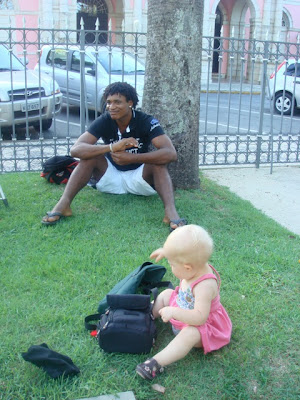For the last several mornings, when Helena Iara has come to the breakfast table, she has pointed first at one thing, and then at another, perhaps asking to taste things or just to hold them in her hands. Today, she pointed to Rita's mother's coffee cup, and the coffee had cooled enough that Rita's mom offered her a little bit. Helena tasted it and made a strange face. We all laughed, which made Helena ask for the coffee again. This time she drank a couple of drops, made the same face again, and then looked up. "It's good," she said clearly. "É bom."
 Now, my guess is that Helena was repeating what we say any time that she doesn't like food or drink. "It's good," we say, as a way to convince her to try it again. What she has interpreted, however, is that "it's good" means "Helena doesn't like the taste of this," as if the comment were descriptive, and not prescriptive. Because what we really "mean" -- our purpose with the words -- by saying "this is good," is "you may not like it, but try it again." Which is exactly what Helena had done with the coffee. She thought it was awful, but she asked to try again. "It's good."
Now, my guess is that Helena was repeating what we say any time that she doesn't like food or drink. "It's good," we say, as a way to convince her to try it again. What she has interpreted, however, is that "it's good" means "Helena doesn't like the taste of this," as if the comment were descriptive, and not prescriptive. Because what we really "mean" -- our purpose with the words -- by saying "this is good," is "you may not like it, but try it again." Which is exactly what Helena had done with the coffee. She thought it was awful, but she asked to try again. "It's good." The most famous "It is good" in the history of the world is probably Yahweh's, who, at the end of each day of creation, looked at the world and saw that it was good. I wonder if we shouldn't use Helena's interpretation of "It's good" to re-think those lines from Genesis. It might, in fact, be Yahweh describing the results of creation. But it might also be prescriptive, or even Helena's idea of "It's not really good, but I'll keep trying."
The most famous "It is good" in the history of the world is probably Yahweh's, who, at the end of each day of creation, looked at the world and saw that it was good. I wonder if we shouldn't use Helena's interpretation of "It's good" to re-think those lines from Genesis. It might, in fact, be Yahweh describing the results of creation. But it might also be prescriptive, or even Helena's idea of "It's not really good, but I'll keep trying."When we look through a baby's mind, even the simplest words can be wonderful complex and ambiguous.




















